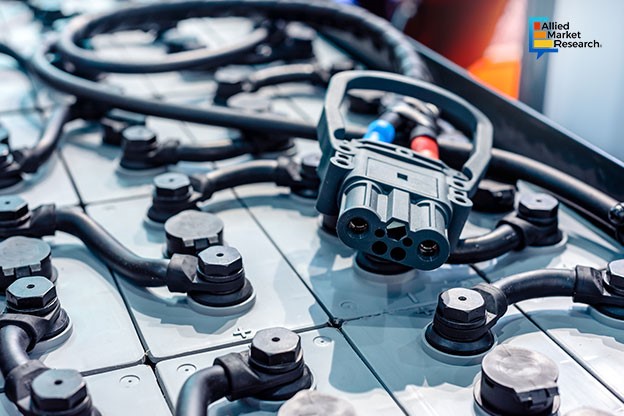Which Upcoming Trends in the Forklift Battery Industry Should Battery Manufacturing Businesses Be Aware of?

26 Apr
2024
Highlights:
- Introduction
- Latest developments in the forklift battery industry
- Innovative product launches in the sector
Forklifts, also called industrial trucks, are some of the most widely used machines in manufacturing industries and warehouses. Traditionally, these industrial trucks were powered using fossil fuels like petrol and diesel; however, the idea of electric mobility has been adopted in this domain also. Forklifts and industrial trucks are some of the first vehicles to shift to electric mobility as early as the 1930s. These vehicles have been powered by battery packs which are specifically designed for forklifts. Forklift batteries, as they are called, have undergone a huge transformation in the past few years, due to the emergence of several technologies and innovations.
Studying the latest trends and developments in the forklift battery industry
Conventionally, the batteries used in forklifts and industrial trucks have always been lead-acid batteries. These batteries are preferred due to their capacity to produce high current and low voltage ratings. Moreover, these batteries are relatively cheaper as compared to other types and come in various sizes to suit the requirements of different vehicles. However, the disadvantages associated with lead-acid batteries have become apparent in the past few years; the charging time of these batteries is very high, and the electrolyte is corrosive which can damage the entire system if not handled properly. Due to these factors, there is an increasing reliance and demand for lithium-ion batteries.
Lithium-ion batteries have become a popular choice for powering forklifts due to their high efficiency and better life cycle. These batteries are much lighter in weight as compared to other types of batteries and also provide higher power than traditional battery systems. Moreover, the charging time required for lithium-ion batteries is much less and the cost of maintenance is also lower. Due to these advantages, the lithium-ion segment of the forklift battery industry accounted for 53.8% of the total revenue of the industry in 2022 and is predicted to continue its dominance in the coming period.
Apart from these advancements, forklift battery manufacturing companies have invested heavily in R&D activities to develop advanced battery management systems. The battery management system is a new technology that has a dedicated function of overseeing the maintenance of the rechargeable battery pack and protecting it from operating outside the safe operating zone. Thus, the robust working of the battery management system (BMS) is crucial for the proper functioning of the battery pack.
In the past few years, forklift battery manufacturers have started adopting emerging technologies like Artificial Intelligence (AI) and machine learning (ML) to improve the operation and maintenance of BMS. These advanced technologies help the BMS predict the maintenance needs of the battery pack, thereby reducing downtime and maintenance costs. The use of wireless charging technologies is another area that has witnessed significant developments in recent times.
How have forklift battery manufacturers played an important role in transforming the industry?
Along with investing in advanced technologies like AI and machine learning, many forklift battery manufacturers have launched their products to stay ahead of the competition in the industry. For instance, in January 2020, Mitsubishi Caterpillar Forklift America Inc. (MCFA), a material handling equipment manufacturer, announced the launch of the Jungheinrich® Lithium-ion battery technology. The company released a statement after the launch saying that the technology will address the growing demand from forklift manufacturing companies to shift away from lead-acid batteries.
Similarly, in March 2024, Green Cubes Technology, a leading designer and manufacturer of lithium power systems, announced the launch of Lithium SAFEFlex PLUS batteries. The company has claimed that these batteries are specially designed for heavy industrial truck applications and include features such as distributed BMS intelligence, individual cell monitoring, network, security protocol, and many more. The battery system is designed in such a way that it can work efficiently even in low-temperature cold storage applications.
To summarize, the growth of the forklift battery industry can be attributed to the growing shift toward lithium-ion batteries. Furthermore, the advancements in battery management systems and the launch of advanced batteries by several companies in the sector are predicted to open new opportunities in the coming period.
For a comprehensive study on the different growth drivers and investment opportunities in the industry, feel free to contact us.

Akhilesh Prabhugaonkar
Author's Bio- Akhilesh Prabhugaonkar holds a bachelor’s degree in Electronics Engineering from the reputed Vishwakarma Institute of Technology. He has a special interest in the fields of forensics, world history, international relations and foreign policy, sports, agriculture, astronomy, security, and oceanography. An ardent bibliophile and melophile, Akhilesh loves to write on topics of his interest and various other societal issues. This love for writing made him enter the professional world of content writing and pursue his career in this direction.
Avenue: Entire Library membership of Allied Market Research Reports at your disposal
- Avenue is an innovative subscription-based online report database.
- Avail an online access to the entire library of syndicated reports on more than 2,000 niche industries and company profiles on more than 12,000 firms across 11 domains.
- A cost-effective model tailored for entrepreneurs, investors, and students & researchers at universities.
- Request customizations, suggest new reports, and avail analyst support as per your requirements.
- Get an access to the library of reports at any time from any device and anywhere.
Related Post
-
How are Submarine Cables Transforming Global Connectivity with Enhanced User Experience?
-
Endoscopy Procedures: Transformations in Techniques and Applications
-
AI-Powered Video Analytics: How the Product Actually Works for enterprises
-
Painting Robots: Transforming Precision Coating and Creative Applications
-
Innovations in Pharmacovigilance Systems Advancing Patient Safety
-
Understanding Edge Security: Keeping Data Safe Near the Source
-
Exploring the Use and Advancements of 3D Laser Scanners in Professional Applications
-
Reinforcing Industrial Controls with Smarter Tools and Training








